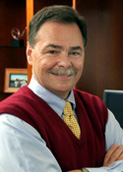
Last month I wrote about the role of academic health centers in leading health care reform. This month, I'd like to share some of the specific legislative activities in which Emory's Woodruff Health Sciences Center (WHSC) is engaged and an overview of some of the most critical issues at hand for our academic health center and its mission.
We're fortunate to have an outstanding team of leaders spearheading this effort, including Chancellor Michael Johns, Vice President of Governmental Affairs John Engelen, and the Office of Governmental Affairs' Washington Representative Cameron Taylor. Over the past month, we have been working with the leaders of eight other large urban academic health centers to evaluate the impact of proposed reforms on our institutions. Two weeks ago, we were able to meet with several House and Senate leaders, with two objectives: (1) to help them understand the complex and vital role of academic health centers (read more about this topic) in the future of health care and (2) to help us anticipate the potential consequences of health care reform.
Several crucial items were on the agenda, including the following:
• Graduate medicial education/indirect medical education cuts: Any reduction in GME/IME would significantly inhibit our ability to train the medical professionals needed to maintain our current health system—much less the system of the future.
• Resident caps: The country already faces a significant physician shortage, but a decade-old law caps residency slots at 1997 levels. The only way the health care system will be able to cope with the increased demand that will follow reform is to lift the resident cap and allow us to expand the physician workforce.
• Geographic variation: Data published in the Dartmouth Atlas erroneously links geographic variations in Medicare spending to over-prescription of service by physicians and hospitals in those regions, without examining the root causes, including the area's poverty, severity of illness, etc. (Read a short article on the geographic variation issue by Michael Johns and John Engelen.)
• Health innovation zones: We support legislation proposed by Pennsylvania Rep. Allyson Schwartz to pilot "health care innovation zones," developed by the Association of American Medical Colleges, that aim to improve patient outcomes while reducing health care spending. (Read an article about health innovation zones by Michael Johns and John Engelen and another on this topic by AAMC President and CEO Darrell Kirch and Edward Miller, dean and CEO of Johns Hopkins Medicine.)
• Disproportionate share hospital cuts: It is critical—especially to AHCs in urban areas—that DSH payments not be cut according to a one-size-fits-all formula. Instead a scale that examines the actual impact of such cuts on specific locales should be devised.
Read more details about Emory’s position on health care reform. Of course, we will continue to update you as developments arise.
As our nation grapples with the issue of ensuring high-quality health care for all people, WHSC will continue to play a leadership role as part of our mission of transforming health and healing … together.
Please share your thoughts and feedback at evphafeedback@emory.edu.
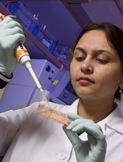 Breast cancer researcher Dipali Sharma
Breast cancer researcher Dipali Sharma
Research awards exceed $484 million
In fiscal year 2008-2009, researchers throughout the WHSC received $446.5 million from external funding agencies, more than 92% of the $484.2 million total received by the university. Also during 2008-2009, these researchers submitted more than $1 billion in research proposals.
The total awards in FY 08-09 for health sciences represents a 15% increase over FY 07-08. Medicine grew by 14% ($321.6*), Yerkes by 18% ($57.2 million), and public health by 12% ($60 million). While awards in nursing declined, with the completion of several major grants, the number of new grant proposals increased by 132% over FY 07-08. This increase, combined with current efforts under way to recruit additional research faculty, is expected to seed the ground for a marked increase next year. Read more.
Since passage of the American Recovery and Reinvestment Act (ARRA) in February, Emory has received 153 ARRA-related grants, for a total of nearly $53.6 million. For more information about the Emory ARRA grants, see website.
*Total does not include an additional $61.9 million received by medical faculty via other units.
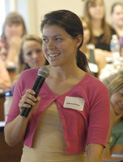 Nursing student Christina Kurhanewicz at orientation
Nursing student Christina Kurhanewicz at orientation
Student enrollment mostly up for 2009
Public health had record enrollment of MPH students (444) this fall, an increase of almost 25% over last year. The school also enrolled 17 new master's students in clinical research and 27 new PhD students. The increase in MPH students in part reflects the fact that the number of students enrolled in global health programs across the United States and Canada has doubled over the past three years. Read more.
Nursing enrolled 86 MSN students, compared with 73 in 2008. BSN enrollment (109) declined slightly from an unexpectedly high yield last year (117), with the lower number closer to its annual enrollment target of 105.
Medicine's first-year class, at 138 students, is its largest ever, as the school increases its number of slots in response to recommendations by groups like the Association of American Medical Colleges that medical schools help increase the number of U.S. doctors.
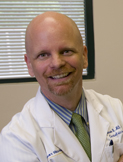 Ted Johnson
Ted Johnson
Johnson named interim director in aging
Ted Johnson has been named interim director of Emory's Center for Health in Aging. Johnson is director of geriatrics in the medical school and associate director/Atlanta site director for the Birmingham/Atlanta VA Geriatric Research, Education, and Clinical Center.
As part of its core mission, the center has created a five-pronged strategy:
- Seek out medical breakthroughs in treatment of chronic and disabling conditions, such as stroke, dementia, congestive heart failure, Parkinson's disease, and urinary incontinence.
- Study basic biologic mechanisms that are the root causes of chronic and degenerative conditions.
- Develop sustainable nutrition and exercise interventions in frail people ages 60 to 70, who within 12 years will potentially be bound for nursing home admission.
- Develop care models (such as palliative care, nursing home diversion programs, enhancements to home visit programs) that transition elements of care now routinely provided in nursing homes to the home, community, and alternative institutions.
- Address societal issues to ensure that the elderly have easy access to food, health care, and meaningful activity in addition to developing model health care delivery programs and supporting care-givers.
According to Johnson, the goal of eliminating routine need for longitudinal, life-long nursing home care for elderly adults is consistent with the 2008 Institute of Medicine report, Retooling for an Aging America: Building the Health Work Force." Read more.
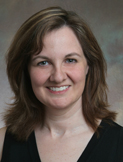 Paula Frew
Paula Frew
Bio stats:
• Asst. Prof., infectious diseases (medicine) and behavioral sciences & health educ. (public health), Emory
• Dir., health communications and applied community research, Hope Clinic
• Project dir., CDC HealthComm Key Project, RSPH and CDC
• PhD, health promotion and behavior, Univ. of Georgia
• MPH, prevention science, RSPH
• MA, health, culture & society, San Diego State Univ.
• BA, sociology and theater, UC San Diego
Contact:
pfrew@emory.edu
Engaging the community in vaccine trials
One in a series of profiles of people in the Woodruff Health Sciences Center
The Emory Vaccine Center's Hope Clinic has been much in the news of late, with its role in August in inaugurating vaccine trials for H1N1 and in May, in two trials for AIDS vaccines, including one home-grown from Emory research. The Hope Clinic depends on local volunteers to be participants in these trials, and it depends on community liaison Paula Frew to help keep the community engaged and involved.
According to Frew, who is the clinic's director of health communications and applied community research, volunteers not only roll up their sleeves for injections and blood draws but also provide valuable insight into ways of enlarging and enhancing the volunteer cohort, increasing the proportion of participation by minorities, for example, who historically have been under-represented in clinical trials.
As the clinic recently prepared to study new approaches of preventing HIV infection among African American men, for instance, representative community members offered Frew advice about the study's logo design and messaging of recruitment materials. In an ongoing phase 1 trial of a microbial agent to prevent vaginal HIV transmission, conducted with the CDC, this same kind of community dialogue resulted in a volunteer enrollment that was almost half African American.
Recently, three new Atlanta-based community partners stepped up to help the Hope Clinic in its education and recruitment efforts with minorities: SisterLove, founded to advance the rights of women in reproductive health and HIV prevention; Someone Cares, for black and Hispanic men who have sex with men; and the National AIDS Education and Service for Minorities, which earlier this year presented Frew with its Lifetime Award for Excellence in Support of HIV/AIDS and Community Service.
"We are very proud of and grateful for the relationships we have developed throughout the community with individuals, churches, and other organizations," says Frew. "They really care about what we are trying to do, and they are generous with their time and service. Without their help, we simply wouldn't have vaccine trials."
Frew first came to Atlanta in 1997. She wanted an MPH degree, and this city "felt like action central" for its abundant opportunities in public health research. She joined the Hope Clinic when it was little more than a concept operating out of the Emory Vaccine Center and has helped it grow into one of the country’s strongest community-based vaccine trial organizations in the country.
Along the way, she also completed a PhD. "I was determined to finish before my daughter was old enough to realize how crazy her overloaded mother really was," she says. Her dissertation on community engagement in HIV vaccine research gave way to the teaching and research responsibilities she now holds in infectious diseases in the medical school, with a secondary appointment in behavioral sciences and health education in RSPH. Read more about Frew's research.
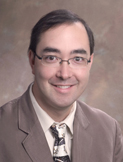 Marc Overcash is a 2009 fellow of the Woodruff Leadership Academy.
Marc Overcash is a 2009 fellow of the Woodruff Leadership Academy.
Are you interested in incorporating Emory's new look on your website or in making your site more interactive? Emory unveiled a new website design last year, and along with the new look came design templates for school and department web pages and a new office that can help in making the transition to the new format.
The Web Design Group of Emory's Office of Information Technology was formed in July to assist schools and departments with creating new websites, designing interactive applications, and migrating existing sites into Emory's new design template.
"Many divisions wanted to redo or update their site but lacked a mechanism to do so other than hiring consultants," says Marc Overcash, the university's deputy CIO. "When we reviewed a number of consulting engagements, it was clear that we could provide a high-quality web design service at half the cost of consultants with no increase in allocation to the schools. With a need, a strong team, and a model that would save the university money, it made a lot of sense to move forward."
The group also works with schools or departments to better organize the content on their pages. "How a site's content is organized—or not—can make or break a site," says Donna Merit, the group's manager. "Good architecture and information design bring return visitors, but bad design can frustrate users and leave a negative impression."
In addition to a new look and feel, the group's clients benefit from the features of the university's new content management system, known as Cascade. Updating pages after the initial migration is easy in Cascade, so site owners don't require any special technical know-how to keep their content fresh.
"We make the standard templates and the content management system work for you," says Merit. "Our typical client is someone in an administrative or communications role who doesn't have technical web development experience but needs to update his or her group's web pages. We build out the site with ease of maintenance as a top priority."
The group works closely with other resource groups around campus, including Emory's Brand Advisory Council. "We have established relationships with other offices on campus and know Emory's guidelines, a time- and money-saving advantage over outside vendors," Merit says.
The team consists of Emily Porter (information design and technical development), Lindsay Paroczai, (content analysis and migration), and Donna Merit, (technical development, information architecture, and project management). Contact Merit at 404-727-1395, donna.merit@emory.edu.
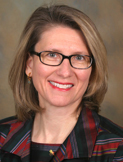
Sheryl Gabram
• Avon gives $750K for continued work in breast cancer
The Avon Foundation awarded $750,000 to the Emory Winship Cancer Institute and the Avon Comprehensive Breast Center at Grady Hospital for continued community outreach, education, clinical access, and research affecting care for the underserved. Surgical oncologist Sheryl Gabram, principal investigator on the grant, says that Avon support in previous years has yielded substantial returns in helping this population. "The number of women diagnosed with breast cancer at early stages has doubled in recent years, with a corresponding decrease in the number diagnosed with late-stage disease. We are providing 16,000 mammography and other diagnostic services annually, a significant increase over past years." Read more.
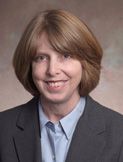
Kathy Griendling
• Medicine inaugurates MilliPub Club
The medical school recently hosted the first meeting of the new MilliPub Club, formed to honor faculty who have published papers individually garnering 1,000 or more citations. The club currently has 17 members, including cardiology researcher and Woodruff Leadership Academy fellow Kathy Griendling, who has published four papers with this distinction. The club is sponsored by the medical school, but membership is open to any qualifying Emory faculty member. For more information, please contact Kelly Shaw, ksimily@emory.edu.
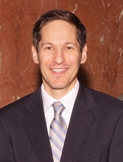 Thomas Frieden
Thomas Frieden
• WHSC hosts reception for CDC's Frieden
The WHSC hosted a reception in mid September for new CDC director Thomas Frieden, who assumed office in June. EVPHA and New York native Fred Sanfilippo congratulated Frieden for his accomplishments during a seven-year stint as New York City health commissioner. Rollins School of Public Health dean James Curran, who himself spent more than two decades at CDC, recounted examples of the symbiotic relationship between Emory and CDC—which long have traded talent and partnered in research. "When our school put out a call recently for 10 student volunteers to help the CDC with flu surveillance," Curran said, "85 showed up." He invited Frieden to learn more about CDC-funded projects at Emory, such as the Emory Center for Injury Control and the Preparedness and Emergency Response Research Center. Read more about the Emory-CDC relationship.
 Video on autism researchers David Ledbetter and Christa Lese Martin
Video on autism researchers David Ledbetter and Christa Lese Martin
• Link to Emory health videos on YouTube
Looking for Emory videos to enhance your web pages? Chances are, you might be able to find material relevant to your needs from a growing library of Emory videos now available on YouTube. The university's YouTube channel features nearly 100 health-related videos, many focused on research and innovations, on a special health sciences "mini-channel." In addition, Emory Healthcare has a separate YouTube channel aimed at patients and potential employees. For more information, contact Wendy Darling, wdarlin@emory.edu.
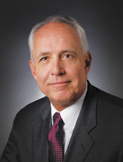 Darrell Kirch
Darrell Kirch
• Please note these dates
- Future Makers: Darrell Kirch, president and CEO of the Association of American Medical Colleges, will be the speaker at the next EVPHA-sponsored Future Makers lecture on Thurs., Oct. 29, in the WHSCAB auditorium at 5 p.m.
- Free screening: The Emory Winship Cancer Institute is offering a free breast health screening on Tues., Oct., 6, from 4:30 to 6:30 p.m. This event is free, and refreshments will be provided. To register, please call Emory HealthConnection at 404-778-7777.
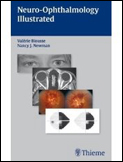
• Neuro-ophthalmology demystified
- Emory Eye Center neuro-ophthalmologists Nancy Newman and Valerie Biousse have collaborated to write Neuro-Ophthalmology Illustrated (Thieme Verlag), an atlas-like book intended to de-mystify the perceived complexity of their specialty. The book has almost 900 images and covers anatomy and pathophysiology as well as diagnosis and management. Read more.
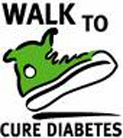
• Please donate to a good cause
Team Emory still has quite a way to go to reach its fund-raising goal for the 2009 Juvenile Diabetes Research Foundation (JDRF) Walk on Sat., Oct. 17, at Centennial Olympic Park. Don't have time to walk? You can make a donation online in less than 2 minutes on the JDRF website:
Click on "Donate Now" in the top right-hand corner, select "Click here to donate to a walker, enter "Emory" in the space for team name, enter state, click "Find Walker," click on any of the team captains' names, click on "Donate to this walker," and then make your donation. If you prefer to send a donation by mail, make your check out to JDRF, note "Emory" on the memo line, and mail to the JDRF Georgia Chapter, 3525 Piedmont Road NE, Building 6, Suite 300, Atlanta, GA 30305. Please contact Traci Galatas (traci.galatas@emoryhealthcare.org or 404-778-3701) if you have any questions.
Meanwhile, Emory Healthcare is an official sponsor again this year of the American Heart Association Heart Walk on Sat., Nov. 7, at Turner Field. EHC has a page on its website dedicated to information about this walk, including a link to "Join a team or make a donation." For more information, please contact Rebecca Migliaccio (rebecca.migliaccio@emoryhealthcare.org or 404-778-4476.

